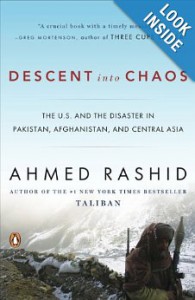 Publisher Lazy, Content Shines, June 6, 2009
Publisher Lazy, Content Shines, June 6, 2009
Roberto J. Gonzalez
It infuriates me to run across mediocre publishers who refuse to use the simple tools that Amazon provides for loading a proper description of the book, providing the table of contents, or even offering “look inside the book” where an index can sell a book faster than the table of contents.
Minus one star for a rotten lazy publisher. Here is the table of contents. Buy the book, along with Anthropological Intelligence: The Deployment and Neglect of American Anthropology in the Second World War this is fundamental reading that calls into question both the sanity of how we engage with foreign publics, and the incompetence combined with mendaciousness with which we seek to abuse the profession of anthropology for wrong ways and wrong ends.
The highest praise I can give to this book is that it forced me to think and it inspired new work–my forthcoming article on Human Intelligence: All Humans, All Minds, All the Time (see comment for URL) was directly inspired by this book and the huge mess the U.S. Army is making of the Human Terrain Teams (HTT), code for abused pretend anthropologists without a clue. I have the fly-leaf note: our HUMINT is at war with itself.
The kindest thing I can do for the brilliantly selected and organized contributors to this volume is respect their work by providing the table of contents, which has reminded me better than my own notes of how diverse and valuable this collection is.
Part I: War, Peace, and Social Responsibility
01 Franz Boas, “Scientists as Spies” (1919)
02 Margaret Mead, “Warfare is Only an Invention–Not a Biological Necessity” (1940)
03 Marshall Sahlins, “Once You've Broken Him Down…” (1965)
04 Gerald Berreman, “Contemporary Anthropology and Moral Accountability” (1973)
05 Laura Nader, “Two Plus Two Equals Zero–War and Peace Reconsidered”
06 Beatriz Manz, “Dollars that Forge the Guatemalan Chains”
07 David Price, “Anthropologists as Spies” (2000)
08 Pierre Bourdieu, “Abuse of Power by the Advocates of Reason” (1998)
Part II: Prescient Anthropology: Diagnosing Crises Abroad
09 Robert Hayden, “West Must Correct Its Mistakes in Yugoslavia” (1992)
10 Robert Hayden, “NATO Fuels the Balkan Fire” (1999)
11 Anna Simons, “No Exit From Somalia” (1991)
12 Anna Simons, “Our Abysmal Ignorance About Somalia” (1992)
13 Anna Simons, “The Somalia Trap” (1993)
14 Winifred Tate, “Increased Military Aid to Colombia Won't Curb Drug Trafficking” (1999)
15 Winifred Tate, “Colombia” Rules of the Game”, 2001
16 Lesley Gill, “Unveiling US Policy in Colombia” (2002)
17 Marc Edelman, “The Price of Free Trade: Famine” (2002)
18 Ali Qleibo, “How Two Truths Make One Tragedy” (2000)
19 Jeff Halper, “The Matrix of Control” (2201)
20 Jeff Halper, “After the Invasion: Now What” (2002)
21 Hugh Gusterson, “If U.S. Dumps Test Ban Treaty, China Will Rejoice” (2001)
Part III: Prelude to September 11
22 Ashraf Ghani, “Cut Off the Arms Flow and Let Afghans Unite” (1989)
23 James Merryman, “US Can Strengthen African Ties in Wake of Terrorism with Aid, Clear Policies” (1998)
24 Robert Fernea, “Egyptians Don't Like Saddam, But….” (1991)
25 Barbara Nimri Aziz, “Gravesites–Environmental Ruin in Iraq” (1997)
26 Fadwa El Guindo, “UN Should Act to Protect Muslim Women” (1998)
27 Zieba Shorish-Shamley, Interviewed, “Women Under the Taliban” (2001)
28 William Beeman, “Follow the Oil Trail–Mess in Afghanistan Partly Our Government's Fault” (1998)
Part IV: Anthropological Interpretations of September 11
29 Catherine Lutz, “Our Legacy of War” (2001)
30 David Harvey etal, “Local Horror, Global Response” (2001)
31 William Beeman, “A War Our Great-Grandchildren Will Be Fighting–Understanding Osama Bin Laden” (2001)
32 Janet McIntosh, “What Have 9/11 Investigators Overlooked?” (2002)
Part V: On Afghanistan, Central Aisa, and the Middle East
34 Robert Canfield, “Nation is Home to Afghans, Mujahedeen, Taliban, Afghan-Atabs, to Name a Few” (2001)
35 Ashraf Ghani, “The Follow of Quick Action in Afghanistan” (2001)
36 Nazif Sharrani, “Afghanistan Can Learn From Its Past” (2001)
37 Zieba Shorish-Shamley Interviewed, “Women in the New Afghanistan” (2001)
38 David Edwards and Shahmahmood Miakhel, “Enlisting Afghan Aid” (2001)
39 Kamran Asdar Ali, “Pakistan's Dilemma” (2001)
40 Francesca Mereu etal, “War Destroyed Chechnya's Clan Structure” (2002)
Part VI: Examining Militarism and the “War on Terror”
41 William Beeman, “U.S. Anti-Terrorist Message Won't Fly in Islamic World” (2001)
42 David Price, “Terror and Indigenous Peoples–War without End”
43 John Burdick, “Afghan War Could be Recruiting Tools for Terrorists” (2001)
44 Dale Eickelman, “First Know the Enemy, Then Act” (2001)
45 John Burdick, “Sept 11 Exposes Futile Search for `Perfect' Missile Defense” (2001)
46 Roberto Gonzalez, “Ignorance Is Not Bliss,” (2202)
47 Mahmood Mamdani, “Turn Off Your Tunnel Vision” (2002)
48 Thomas McKenna Interviewed, “The Roots of Muslim Separatism in the Philippines” (2002)
Part VII Academic Freedom and Civil Liberties
49 Roberto Gonzalez, “Lynn Cheney-Joe Lieberman Group Puts Out a Blacklist” (2001)
50 David Price, “Academia under Attack: Sketches for a New Blacklist” (2001)
51 Hugh Gusterson, Interviewed, “Lynn Cheney's Free Speech Blacklist” (2002)
52 Laura Nader, Harmony Coerced Is Freedom Denied” (2001)
Epilogue: Unconventional Anthropology: Challenging the Myths of Continuous War
I was pleased to see several CounterPunch contributions. I respectfully encourage Amazon readers to seek out my CounterPunch short piece on “Intelligence for the President–AND Everyone Else.” Obama is a front for the Borg, he is not getting proper decision-support, and neither is any other element of the government. We need to get back into being the sovereign people.
In addition to the book cited above, I recommend:
War is a Racket: The Antiwar Classic by America's Most Decorated Soldier
Confessions of an Economic Hit Man
The Global Class War: How America's Bipartisan Elite Lost Our Future – and What It Will Take to Win It Back
None So Blind: A Personal Account of the Intelligence Failure in Vietnam
Who the Hell Are We Fighting?: The Story of Sam Adams and the Vietnam Intelligence Wars
The Fifty-Year Wound: How America's Cold War Victory Has Shaped Our World
The Unconquerable World: Power, Nonviolence and the Will of the People
The Shock Doctrine: The Rise of Disaster Capitalism








